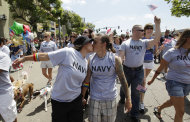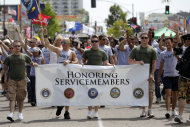CAMP PENDLETON, Calif. (AP) — The Defense Department on Thursday announced it is allowing service members to march in uniform in a gay pride parade for the first time in U.S. history.
In a memorandum sent to all its branches, the department said it was making the allowance for San Diego's gay pride parade on Saturday even though its policy generally bars troops from marching in uniform in parades.
The
Defense Department said it did so because organizers had encouraged
military personnel to march in their uniform and the event was getting
national attention.
The move came only weeks after the Pentagon
joined the rest of the U.S. government for the first time in marking
June as gay pride month and made an official salute to gay and lesbian
service members.
Defense Secretary Leon Panetta vowed in a video
message to remove as many barriers as possible to making the military a
model of equal opportunity and said gays and lesbians can be proud in
uniform with the repeal last year of the "Don't Ask, Don't Tell" law.
Last
year, San Diego's gay pride parade had the nation's largest contingency
of active-duty troops participate before the military lifted its ban on
openly gay service members. About 200 service members last year wore
T-shirts with their branch's name.
Former sailor Sean Sala, who
organized the military's participation in the parade, said he wanted
service members to wear their official uniform this year to show there
is no longer anything to hide.
"My soul is on fire," he said after
hearing the news Thursday. "They don't fight in T-shirts. They fight in
uniforms. This is about showing who they are."
The Pentagon said the allowance is only for this year's parade in San Diego and does not extend beyond that. Military personnel wearing civilian clothes do not need permission to march in any parades.
The
Defense Department policy says personnel cannot march in parades in
uniform unless they receive approval from their commanding officers or
other Pentagon-approved authorities.
Sala believes there will be
no going back after Saturday. He said he has reached his dream in seeing
the U.S. military sanction participation in a gay pride parade, as the
armed forces have done in Canada and Great Britain,
Uniformed
soldiers in those countries have marched down the streets of Toronto and
London next to scantily clad men, drag queens and civil rights
activists.
"I think across the country we will start seeing active-duty members in uniform march in pride parades," Sala said.
San Diego Pride Executive Director Dwayne Crenshaw called it an historic moment.
"San
Diego Pride is honored to have the privilege of celebrating our country
and our service members with dignity and respect," he said. "The fight
for equality is not over, and it is not easy, but this is a giant leap
in the right direction."
Before Thursday, several service members
wanting to participate in San Diego's parade were told they could not do
so in uniform. Others were granted permission by their commanding
officers.
"I think many people thought after 'Don't Ask, Don't
Tell' was gone, discriminatory things would be eradicated," Sala said.
"But now these parades have become a very sticky subject as far as
commanders using their own discretion because they are showing either a
bias toward a pride parade, or the right view, which this is about
recognizing who people are."
Before
the repeal, gay troops could serve but could be discharged if they
revealed their sexual orientation. At the same time, a commanding
officer was prohibited from asking a service member whether he or she was gay.
More
than 300 service members have signed up to participate this year in the
San Diego parade. It was unclear how many will wear their uniform.
The
Defense Department said in its message to the service members that they
should adhere to policy regarding behavior while wearing their
uniforms.
Service members in
uniform cannot appear to endorse or selectively benefit groups or
individuals, provide a platform for a political message, or appear to be
commercially sponsored. They also must ensure their presence in uniform
is not intended to increase sales and business traffic.
Air
Force Officer Joanna Gasca was among those who risked marching last
year in a T-shirt. Her commanding officer had given her permission to do
so this year before Thursday's memorandum was issued.
"It
was absolutely thrilling last year to walk down the street," the
47-year-old Air Force recruiter said. "But this year — to be able to
march in uniform — wow! I'm speechless."



